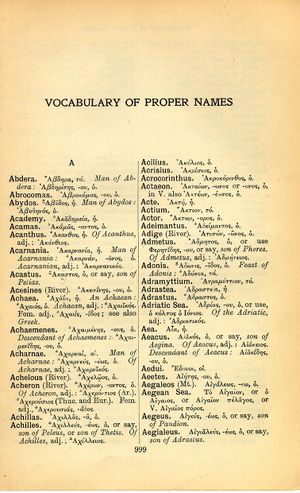Abdera: Difference between revisions
Εἷς ἐστι δοῦλος οἰκίας ὁ δεσπότης → Unus familiae servus ipse adeo est herus → Nur einen Sklaven gibt's allein im Haus, den Herrn
m (Text replacement - "link={{" to "link={{") |
m (Text replacement - "}}]]" to "}}]]") |
||
| Line 1: | Line 1: | ||
{{WoodhouseENELnames | {{WoodhouseENELnames | ||
|Text=[[File:woodhouse_999.jpg|thumb | |Text=[[File:woodhouse_999.jpg|thumb | ||
|link={{filepath:woodhouse_999.jpg | |link={{filepath:woodhouse_999.jpg}}]]Ἄβδηρα, τά. | ||
<b class="b2">Man of Abdera</b>: [[Ἀβδηρίτης]], -ου, ὁ. | <b class="b2">Man of Abdera</b>: [[Ἀβδηρίτης]], -ου, ὁ. | ||
Revision as of 10:10, 15 August 2017
English > Greek (Woodhouse)
Ἄβδηρα, τά.
Man of Abdera: Ἀβδηρίτης, -ου, ὁ.
Latin > English (Lewis & Short)
Abdēra: ōrum, n., and ae, f., =Ἄβὀηρα.
I Abdera, a town on the southern coast of Thrace, not far from the mouth of the Nestus, noted for the stupidity of its inhabitants. It was the birthplace of the philosophers Protagoras, Democritus, and Anaxarchus; n., Liv. 45, 29, 6; Gell. 5, 3, 3; f., Ov. Ib. 469; Plin. 25, 8, 53, § 94 dub.; 4, 11, 18, § 42: hic Abdera, non tacente me, here was Abdera itself, Cic. Att. 4, 17, 3 (4, 16, 6).—
2 Folly, stupidity, madness, Cic. l. l. (cf.: id est Ἀβὀηριτικόν, i. e. stupid, id. Att. 7, 7, 4, and Arn. 5, p. 164; Juv. 10, 50; Mart. 10, 25, 4).—
B Hence, derivv.
1 Abdērīta and Abdērītes, ae, m., =Ἀβὀηριτς, an Abderite: Democritus Abderites, Laber. ap. Gell. 10, 17: Abderites Protagoras, Cic. N. D. 1, 23, 63; cf. id. Brut. 8: de Protagora Abderita, id. de Or. 3, 32, 128: Abderitae legati, Liv. 43, 4, 8; cf. id. § 12 sq.; Vitr. 7, 5, 6; Just. 15, 2 al.—
2 Ab-dērītānus, a, um, adj., of Abdera, meton. for stupid, foolish: Abderitanae pectora plebis habes, Mart. 10, 25, 4.—
II A city of Hispania Baetlca, on the southern coast, now Adra, Mel. 2, 6, 7; Plin. 3, 1, 3, § 8.
Latin > French (Gaffiot 2016)
Abdēra,¹⁶ æ, f., Cic. Att. 4, 17, 3 ; Plin. 6, 217, et Abdēra, ōrum, n., Liv. 45, 29, 6, Abdère, ville de Thrace.
Latin > German (Georges)
Abdēra, ōrum, n. (Ἄβδηρα, τὰ), I) Stadt in Thracien, Geburtsort des Protagoras u. Demokrit, j. Polystilo oder Asperosa, Liv. 45, 29, 6. Plin. 4, 42, berüchtigt durch den Stumpfsinn u. die Kleinstädterei ihrer Einwohner; dah. hic Abdera, Cic. ad Att. 4, 16, 6: u. o Abdera, Abdera, dares quantas vias mortalibus irridendi, Arnob. 5, 12. – Nbf. Abdēra, ae, f., Ov. Ib. 465. Plin. 25, 94. Solin. 10, 10. Vgl. K.F. Hermann Versuch einer urkundl. Geschichte von Abdera (in dessen Abh. u. Beitr. zur klass. Literat. S. 106 ff.). – II) Stadt in Spanien, j. Adra, Mela 2, 6, 7 (2. § 94). – Dav. a) Abdērītēs, ae, Abl. a, m. (Ἀβδηρίτης), einer aus Abdera, ein Abderit, Laber., Cic. u.a. – b) Abdērītānus, a, um, abderitisch = stumpfsinnig, Mart. 10, 25.

